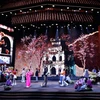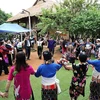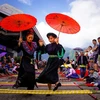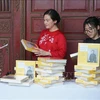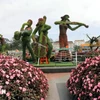The northern province of Bac Ninh is home to many cultural heritage, particularly UNESCO-recognised love duet singing (Quan ho) and ceremonial singing (Ca tru), along with Dau and But Thap pagodas that have recently won special national heritage recognition.
Love duet singing, an art form that combines various elements, including music, lyrics, costume and a unique style of singing reflecting the affinity between the singers, and featuring the distinctive culture of people in the region formerly called Kinh Bac, was recognised by UNESCO as an intangible cultural heritage of humanity in 2009.
The same year, Ca tru, an ancient type of music also known as “hat a dao” or “hat noi”, was also listed by the organisation as an intangible cultural heritage in need of urgent protection.
The most widely known type of ca tru involves only three performers: a female vocalist, a lute player and a spectator.
Located in Thanh Khuong commune, Thuan Thanh district, Dau pagoda was built in the 2 nd century AD and is claimed to be the “Cradle” of Buddhism in Vietnam .
The annual Dau pagoda festival, which falls on the 8 th of the fourth month, is a brilliant opportunity for visitors to study the pagoda’s history, myths, legends and outstanding architectural features.
Meanwhile, But Thap temple in Dinh To commune, Thuan Thanh district is one of only a few ancient pagodas in Vietnam with the unique architecture of the Le-Nguyen dynasties that still exist.
The temple houses unique statues, including the remarkable Avalokitesvara with one thousand eyes and one thousand arms, which was recognised as a national treasure in 2012.
As a cradle for various national historical and cultural vestiges, Bac Ninh province is making great efforts in conserving its intangible cultural heritage, looking towards the development of cultural tourism.
It has spent 13.5 billion VND (more than 600,000 USD) implementing a project to preserve Quan ho. So far, apart from in 44 original Quan ho villages, the folk art is practised at 329 more villages and is taught in various schools in the province.
At the same time, many Ca tru clubs have been established in Thuan Thanh, Gia Binh and Yen Phong districts with almost 100 regular members.
Between 2003 and 2006, the province spent over 15 billion VND (705,000 USD) restoring a number of items at Dau pagoda, and more than four billion VND (188,000 USD) in 2012 upgrading But Thap pagoda.
Local authorities have asked the Ministry of Culture, Sports and Tourism to consider and submit to the Government a number of local vestiges to be recognised as national heritage such as Phat Tich pagoda, Ba Chua Kho (Lady of the Storehouse) temple and Kinh Duong Vuong shrine.
With 547 festivals held annually, Bac Ninh is considered the locality with the most festivals in Vietnam . Many have become national events, such as Ba Chua Kho Festival, Lim Festival, Dau Pagoda Festival, Kinh Duong Vuong Festival and Phat Tich Pagoda Festival, attracting tens of thousands of visitors.
Over the past time, the province has undertaken numerous measures, aiming to preserve and develop these traditional festivals, and prevent superstition and the commercialisation of such events.-VNA
Love duet singing, an art form that combines various elements, including music, lyrics, costume and a unique style of singing reflecting the affinity between the singers, and featuring the distinctive culture of people in the region formerly called Kinh Bac, was recognised by UNESCO as an intangible cultural heritage of humanity in 2009.
The same year, Ca tru, an ancient type of music also known as “hat a dao” or “hat noi”, was also listed by the organisation as an intangible cultural heritage in need of urgent protection.
The most widely known type of ca tru involves only three performers: a female vocalist, a lute player and a spectator.
Located in Thanh Khuong commune, Thuan Thanh district, Dau pagoda was built in the 2 nd century AD and is claimed to be the “Cradle” of Buddhism in Vietnam .
The annual Dau pagoda festival, which falls on the 8 th of the fourth month, is a brilliant opportunity for visitors to study the pagoda’s history, myths, legends and outstanding architectural features.
Meanwhile, But Thap temple in Dinh To commune, Thuan Thanh district is one of only a few ancient pagodas in Vietnam with the unique architecture of the Le-Nguyen dynasties that still exist.
The temple houses unique statues, including the remarkable Avalokitesvara with one thousand eyes and one thousand arms, which was recognised as a national treasure in 2012.
As a cradle for various national historical and cultural vestiges, Bac Ninh province is making great efforts in conserving its intangible cultural heritage, looking towards the development of cultural tourism.
It has spent 13.5 billion VND (more than 600,000 USD) implementing a project to preserve Quan ho. So far, apart from in 44 original Quan ho villages, the folk art is practised at 329 more villages and is taught in various schools in the province.
At the same time, many Ca tru clubs have been established in Thuan Thanh, Gia Binh and Yen Phong districts with almost 100 regular members.
Between 2003 and 2006, the province spent over 15 billion VND (705,000 USD) restoring a number of items at Dau pagoda, and more than four billion VND (188,000 USD) in 2012 upgrading But Thap pagoda.
Local authorities have asked the Ministry of Culture, Sports and Tourism to consider and submit to the Government a number of local vestiges to be recognised as national heritage such as Phat Tich pagoda, Ba Chua Kho (Lady of the Storehouse) temple and Kinh Duong Vuong shrine.
With 547 festivals held annually, Bac Ninh is considered the locality with the most festivals in Vietnam . Many have become national events, such as Ba Chua Kho Festival, Lim Festival, Dau Pagoda Festival, Kinh Duong Vuong Festival and Phat Tich Pagoda Festival, attracting tens of thousands of visitors.
Over the past time, the province has undertaken numerous measures, aiming to preserve and develop these traditional festivals, and prevent superstition and the commercialisation of such events.-VNA





